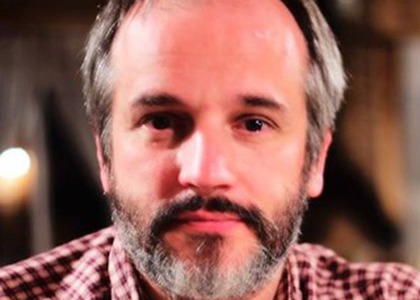> [Archived] Interviews

Interview with Laurențiu Constantin
The Bucharest Early Music Festival will take place between November 10th and 27th, which has reached its 17th edition this year. Laurențiu Constantin, the director of the festival, gives us more details in an interview by Ioana Țintea.
Mr. Laurențiu Constantin, this year, the Bucharest Early Music Festival which you have initiated 17 years ago will take place under the title East and West. Why did you choose this subtitle?
When we talk about an early music festival organized on the eastern border of Europe, it is very close to our musical and artistic vocation. We have scheduled a lot of Baroque music in the previous editions of our festival, butit is natural to also look at the music of this land and to the music from the near East or far East.
I would ask you to give us some details about the organization of the festival. Who are the invited artists and what is new in this year's edition?
The news is precisely those related to the music of the East and the music of the people of the Mediterranean region.We even open the festival on November 10th, at the Bragadiru Palace, with the concert Sephardica, performed by Emilio Villalba and The Cantica Ensemble; this concert being a concert of Sephardic music, music from the Middle Ages of the Hispanic space.
Our festival will also host a concert by one of our oldest friends, Ketil Haugsand, a harpsichord solo - Galant style - on November 12th, at the Anglican Church, a concert with repertoire from the late French musical Baroque, dedicated to the gallant style.
Exquisite, on November 13th, in the royal living room of the national Art Museum of Romania, performed by a duo - harpsichord and Baroque violin - from the ensemble "Le consort" from France. A concert, as well, from the music of the late French Baroque.
On November 15th, at the Auditorium Hall of the Romanian National Museum of Art, we have got Once upon a time - a jazz concert.A very interesting concert, with two Indian classical music performers and an Italian lutenist. A very rare jazz concert... is the second time in the history of the festival that we have hosted a jazz concert on our schedule.
What place does the Romanian music culture component have in this edition?
Romanian music is consistently present in this festival. We are talking about a concert conference on November 17th, in the Enescu Hall of the National University of Music Bucharest, supported by Prof. Nicolae Gheorghiță and, musically, by the Etheros Choir.
Then we are talking about a concert of Byzantine music, Baroque in the Byzantine musical tradition - a very exciting theme. There is a respected Byzantine musicologist who speaks of a baroque in Byzantine music, at about the same time that we all know that baroque was listened to to, as we know it, in Western Europe. The concert is held by the Melos Paisian Choir fromIașiand is preceded by a small conference of the monk PhilotheusBălan, at St. John the Russian Church in Bucharest.
And last but not least, we are talking about the early Romanian music group TreiParale which will perform two concerts: One, in the festival schedule, on November 20th, again at the Auditorium Hall of the Romanian National Museum of Art, and a second - associated with the festival, but not on the festival stage - at the Teatrelli Theater.
You have recently become a Member of the Board of Directors of the European EarlyMusic Network, which comprises 132 members from 23 countries. How did this contribute to the organization of this year's festival?
My presence in the Steering Committee of the European Early Music Network came, from my point of view, as an honorable recognition for what the Bucharest Early Music Festival means in the European landscape, more than what I mean. Naturally, being there and having regular meetings with other colleagues from the European EarlyMusic Network are a source of inspiration.I manage to stay currentwith what is happening especially in Western Europe, where most of the members of the network come from, and to meet first-hand musicians, managers, musicologists who are important today in the European Early Music market.
Translated by Bogdan-Nicolae Tănăsescu,
University of Bucharest, Faculty of Foreign Languages and Literatures, MTTLC, year I
Corrected by Silvia Petrescu














